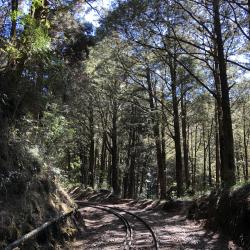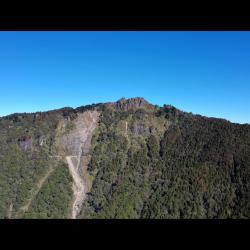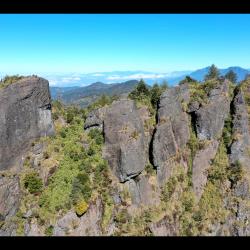Tashan is one of the Alishan mountain ranges. The mountain ranges from east to west. The rock formations are arranged horizontally and stacked on top of each other like a tower. The main peak of Tashan Mountain is 2,663 meters above sea level. It is the holy mountain of the Tsou tribe. The traditional name is Hocubu, which has a meaning of the goblins’ nest and home to the spirits. Tsou people believe that the spirits live on Tashan after death, and that the good spirits live on Big Tashan, while the evil spirits live on small Tashan. Small Tashan is 2,484 meters above sea level, and its traditional name is Maeno, which means peak.
Tashan

The Mianyue Line of the Forest Railway is located inside the Alishan National Forest Recreation Area. It was completed in 1915 and is about 14 km in length from Alishan old station to Songshan station. There are two stations along the way, mainly Tashan and Mianyue. In 1934, the Mianyue Line was dismantled because the logging operation was terminated. In the early post-war period, due to the need for afforestation along the Alishan Forest Railway, the National Government restored the railway up to the Shihou section. However in recent years, the Mianyue Railway has suffered severe damage from the Jiji earthquake and Typhoon Morakot, and is until today still impossible to pass.

Tashan is one of the Alishan mountain ranges. The mountain ranges from east to west. The rock formations are arranged horizontally and stacked on top of each other like a tower. The main peak of Tashan Mountain is 2,663 meters above sea level. It is the holy mountain of the Tsou tribe.
The traditional Tsou name is Hocubu, which has a meaning of the goblins’ nest and home to the spirits. Tsou people believe that the spirits live on Tashan after death, and that the good spirits live on Big Tashan, while the evil spirits live on small Tashan. Small Tashan is 2,484 meters above sea level, and its traditional name is Maeno, which means peak.
